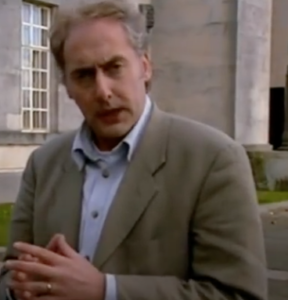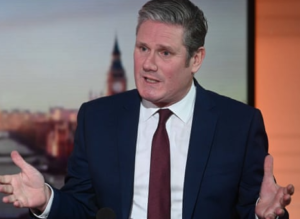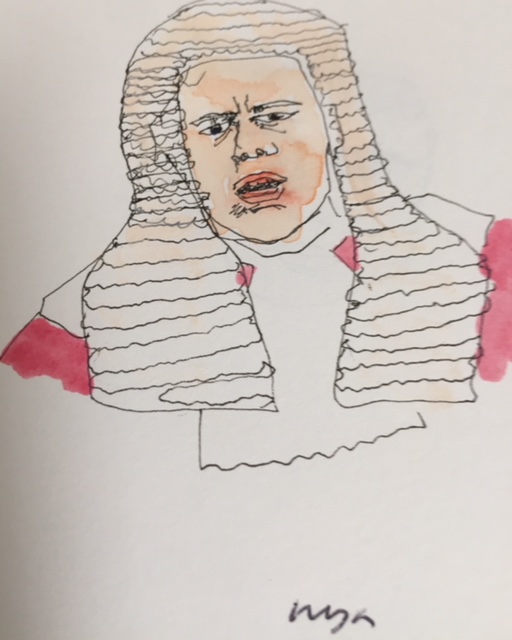- Massaging the truth - 27th February 2026
- ‘It’s the new economy, stupid…’ - 27th February 2026
- Eyes right… - 26th February 2026

During a 40 year career as a journalist, for our Editor Welshman Phil Parry legal issues and knowledge of the law were always paramount, and this is now highlighted by the huge row over an act to resolve finally The Troubles, which has been attacked from all sides, and became a key election fight.
If you don’t know your law you get into SERIOUS trouble!
When I was presenting the BBC Cymru Wales (BBC CW) Current Affairs television programme Week In, Week Out (WIWO) for 10 years in the 1990s, we would be joined by a corporation lawyer almost every Monday who would check every frame and each word of commentary, before the programme was transmitted the following day.

On the Panoramas I fronted for BBC One (BBC 1) it was exactly the same – the programmes were thoroughly checked before transmission.
Sometimes, a lawyer would be consulted weeks before the filming even started.
In fact ahead of a meeting with a specialist lawyer, there had usually been a ‘filter process’ where I had thought of saying things which (I thought) were probably legal before I even went there, because knowledge of the law has always been a fundamental part of my journalism.
In other words you have to be aware of what you can and can’t say, and if in doubt you should always go to a lawyer.

All of this has now been thrown into sharp relief for me because of what is happening in Northern Ireland (NI).
The Troubles (Legacy and Reconciliation) Act which is designed to end once and for all disputes after The Troubles, has been condemned by both sides of the community and has become a key election issue.
NI’s political parties all oppose it.


The Democratic Unionist Party (DUP) call it an “affront to justice”, Sinn Féin (SF) (which became the largest Northern Ireland party at Westminster last week, although they WON’T be taking their seats), describe it as “anti-democratic”, and “unjust”, while the cross-community Alliance Party (AP) have said that it is “unwanted, unworkable and contrary to European and human rights standards”.
Sir Keir Starmer has promised to repeal the act, but the Conservative’s (C) Steve Baker (who lost his seat), has stated that it was needed “because the chances of justice are now vanishingly small”.
 This all comes as a huge number of legal cases after The Troubles grind their way through the courts and other institutions anyway.
This all comes as a huge number of legal cases after The Troubles grind their way through the courts and other institutions anyway.
These too throw the spotlight on how important it is to have a knowledge of the law.
In Belfast, for instance, a former paratrooper is on trial for two murders and five attempted murders related to Bloody Sunday.

In London, survivors of the IRA bombings in the Docklands, Manchester’s Arndale Centre, and at the Old Bailey, are suing the former SF president Gerry Adams for damages.
Meanwhile survivors of the Dublin and Monaghan bombings (the deadliest attacks by Loyalists in the Republic of Ireland [ROI]) are suing the UK Government for failing to prevent them.
In April, an inquest into the appalling 1976 Kingsmill massacre, in which the IRA ambushed and murdered 10 Protestant men, finally concluded after EIGHT years.
You must have knowledge of civil law as well.

More than a thousand civil cases have been lodged with the Ministry of Defence (MoD), the Northern Ireland Office (NIO), and a smattering of other agencies.
As the famous quote about the law puts it: “the wheels of justice turn slowly, but grind exceedingly fine”.

To paraphrase it for journalists: “It’s a slow process knowing about the law, but very important”…
The memories of Phil’s decades-long award-winning career in journalism (when a legal knowledge was all important) as he was gripped by the rare disabling condition Hereditary Spastic Paraplegia (HSP), have been released in a major book ‘A GOOD STORY’. Order it now!

Regrettably publication of another book, however, was refused, because it was to have included names.
Tomorrow – why the sister of a man protesting at his conviction for one of the worst murders in Wales is boosting her campaign to prove his innocence in the wake of the General Election (GE) result.











